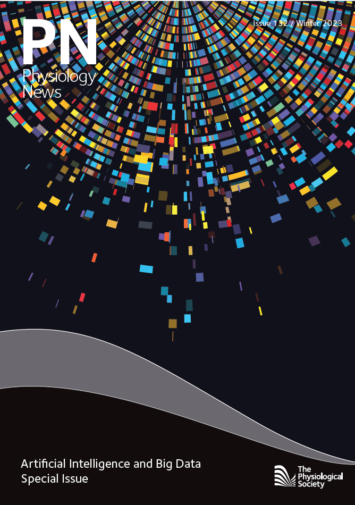
Physiology News Magazine
Editorial
Artificial intelligence: Friend or foe?
Introduction
Editorial
Artificial intelligence: Friend or foe?
Introduction
https://doi.org/10.36866/pn.132.5
Dr Keith Siew
Scientific Editor, Physiology News
Alanna Orpen
Media and Communications Officer, The Physiological Society
This year, artificial intelligence (AI) has dominated the media as the debate oscillates between beliefs it may be the basis of a renaissance and beliefs it may cause humanity’s ultimate demise!
In our special issue on AI and big data, we explore the potentials of AI and try to weigh the good, the bad and the ugly! Indeed, the film review of GATTACA by Sofija Redzic (p14-15) gives us a dystopian insight into a world in which genetic prediction almost eliminates free will. And, whilst scaremongering around new technology is a classic trope of science fiction, it reminds us to tread carefully down the unknown path of living with AI.
One area of focus, and of particular interest to The Society is how AI could transform healthcare. This summer, The Society gathered in Parliament with experts across both the AI and life science fields to tackle the challenges and discuss the integration of physiological measurements and expertise into AI tools. The event was hosted by Stephen Benn, The Viscount Stansgate, with panellists including Stephen Metcalfe MP (Chair of the All-Party Parliamentary Group on AI) and researchers Dr Richard Siow and PhD student Svitlana Surodina (King’s College London, UK) who both feature in our special issue on AI. Dive into the Policy Focus (p8-9) to read the full story about the report “From ‘Black Box’ to Trusted Healthcare Tools: Physiology’s role in unlocking the potential of AI for health” and The Society’s work on AI and health to find out more about the report’s recommendations for the Government to ensure physiology is at the heart of AI’s adoption into healthcare.
Effectively managing the data that AI models are trained on will be vital in ensuring equity in healthcare. Indeed, AI provides a path for fairer, more ethical and comprehensive diagnostic tools. One group developing such a tool are Skein. Svitlana Surodina, one of the panellists from the policy event and Managing Director at Skein, has written a feature article discussing how AI could revolutionise diagnostics for Parkinson’s Disease. On p25- 27, she and her co-authors explain that the key to achieving this is diverse and quality data.
Using big data to develop better treatments is also the goal of work by Professor Christopher Yau and Professor Ahmed Ashour Ahmed. They are creating new DNA sequencing tools and computer programmes to study residual cancer cells. Learn more about their research on p28-31 and find out how AI could advance the future of ovarian cancer treatment and immunotherapy approaches.
We learn about the predictive power of polygenic scores from Agnieszka Gidziela (Queen Mary University of London, UK, p21-24). This feature article is filled with the fascinating history of the method and examples of how scientists use it to estimate the combined effects of many different genes on a specific trait or characteristic. Agnieszka also reveals its value for precision medicine.
While AI has the potential to improve the quality and accessibility of healthcare, it can also reproduce and exacerbate existing problems, including unreliability, misinformation, exploitation of patients and healthcare workers. To learn more about the promises and pitfalls, turn to p16 to read the feature by John Nelson (Georgia Institute of Technology, US) and Alexander Stevens (University of California, US).
We treat you to a showcase of innovative human-centred technologies on p42-45. The case studies cover how AI could improve treatment of sepsis, blood pressure monitoring and how it could even predict heart attacks eight years early. Professor Rohan Lewis (University of Southampton, UK) demonstrates the potential of machine learning to speed up image analysis and explains how the approach can help enhance the health of mothers and babies during pregnancy and across the life course.
The reaches of AI are widespread. With the popular use of large-language models, such as ChatGPT, university staff are concerned about students writing assignments. In response to this, Dr Matthew Hardy (University of Bradford, UK) has created workshops to teach students how to use AI tools responsibly and ethically. Learn more about his approach for teaching writing skills and the students’ feedback (p38-39). We have more advice for lecturers on p12-13, where Professor Zoran Redzic shares his review of the book ‘Survival kit for the Physiology Lecturer’ by Francisco Suárez et al. Recommended reading for anyone seeking a “survival kit” for exam question preparation.
Along with our articles and studies of AI, The Society’s Chief Executive Dariel Burdass celebrates The Society’s achievements of 2023 (p7). The celebratory note sings throughout the issue with Physiological Reports 10-year anniversary (p11) and rounding off with our congratulations to our new Honorary Fellows and Fellow Members on p40-41. Don’t miss the wonderful snapshot of our growing network and thriving community on p32-37. The meeting reports are filled with photos and quotes from organisers and speakers. We hope these summaries inspire you to convene your own meeting for your research community.
The issue is brought to a close with our obituaries. Two moving accounts of the influence of great mentors and teachers. We hope you enjoy reading about the lives of the courageous Professor Justin Yerbury (p45) and the mesmerising Professor John Nicholls (p46-47).
